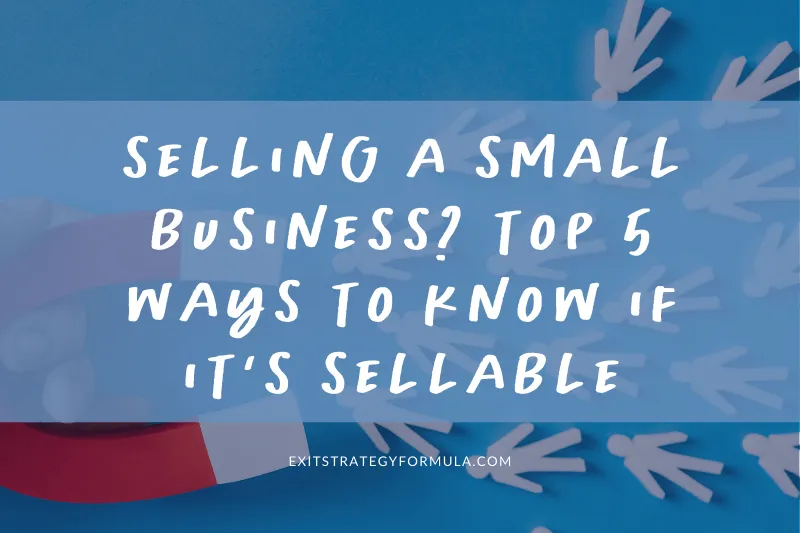
Selling A Small Business? Top 5 Ways to Know if It’s Sellable
Selling a small business can be a complicated and emotional process, but it can also be a great opportunity to realize a significant return on investment and move on to new ventures.

When considering whether to start the business selling process, it is important to understand what makes a business sellable and what factors potential buyers will consider when evaluating your business. In this article, we will discuss the top 5 ways to know if your small business is sellable, whether you hire a business broker or not.
Table of Contents
Financial Performance: A Strong Financial Track Record
Market Demand: Growing and Sustainable Demand
Unique Value Proposition: A Clear and Compelling Value Proposition
Not sure if you have a clear and compelling value proposition?
Strong Operations: Streamlined Operations and Efficient Systems

Financial Performance: A Strong Financial Track Record
The financial performance of a business is a key factor in determining its sellability. A strong financial track record, including consistent revenue growth and profitability, is attractive to potential buyers in sales as it provides evidence of the business's stability and ability to generate profits. A business with a history of financial success is more likely to be valued higher and receive more interest from potential buyers.
When preparing to sell your business, it is important to review your financial records, including your income statements and balance sheets, to ensure that they accurately reflect the performance and health of your business.
You need to look at various financial metrics and indicators to determine if your business's financial performance is strong enough to start the sales process. Here are some key factors to consider:
Revenue growth:
Consistent revenue growth over time is a strong indicator of a healthy business. It shows that your business has a growing customer base and can generate more revenue each year, and helps increase your asking price.
Profitability:
A profitable business is more attractive to potential buyers, as it shows that the business can generate profits and generate positive cash flow. Beyond your financial statements' bottom line, it is important to look at both your gross profit margin and net profit margin to get a comprehensive understanding of your business's profitability.
Cash flow:
Positive cash flow is critical for a business's continued success. It shows that the business is generating enough cash to cover its operating expenses and that money is available for investment in growth and improvement.
Debt to equity ratio:
This ratio measures the amount of debt the business has relative to its equity. A low debt-to-equity ratio is a positive sign, as it indicates that the business has a solid financial foundation and is not overly reliant on debt to finance its operations.
Return on investment (ROI):
ROI measures the return that an investment in the business generates relative to the cost of the investment. A high ROI indicates that the business is generating a strong return on investment and is a positive sign for potential buyers.
Market Demand: Growing and Sustainable Demand
Market demand is another important factor in determining a business's sellability. A business with growing and sustainable market demand is more likely to be sellable than one with declining or uncertain demand.
Prospective buyers will want to know that there is a strong demand for your products or services and that this demand will continue. This helps to ensure that the business will continue to generate revenue and be profitable after the sale. If your business operates in a declining market, it may be more difficult to sell and may receive lower offers.
You need to look at various market indicators and trends to determine if your business has a growing and sustainable market demand. Here are some key factors to consider:
Market size:
Look at the size of the market for your product or service. Is the market growing or shrinking? If the market is growing, it may indicate a growing demand for your business.
Market share:
Look at your business's market share compared to your competitors. If your market share is increasing, it may indicate that your business is capturing a growing demand in the market.
Customer feedback:
Ask your customers for feedback on your product or service. Are they satisfied with your offering? Are they using it more or less frequently compared to the past? This feedback can provide insight into the demand for your business.
Competitor analysis:
Look at the competition in your market. Are they growing or shrinking? Are they introducing new products or services that may impact your business? This analysis can give you an understanding of the overall demand in your market.
Industry trends:
Stay informed about the trends and developments in your industry. Are new technologies or innovations emerging that may impact demand for your business? Is there a regulatory or policy change that may affect the demand for your product or service?

Unique Value Proposition: A Clear and Compelling Value Proposition
A business that has a clear and compelling value proposition, such as a unique product or service, is more attractive to potential buyers. This value proposition should be easy to understand and distinguish your business from your competitors.
If your business provides a unique and valuable solution to a problem or need in the market, it is more likely to be sellable. Potential buyers will be more interested in purchasing a business that offers a unique and valuable solution, as this helps to mitigate risk and increase the potential for future success.
Not sure if you have a clear and compelling value proposition?
A compelling value proposition is a clear and concise statement explaining your business's unique benefits to customers. Here are some steps to help small business owners create a compelling value proposition:
Identify your target customer: Understanding your target customer, their needs, and their pain points is critical to creating a compelling value proposition. This information will help you focus your value proposition and ensure that it resonates with your target customer.
Understand your competitors: Understanding your competition and what they offer can help you differentiate your business and create a value proposition that stands out. Look at their products or services, their pricing, and their target customers to gain a comprehensive understanding of the competition.
Define your unique selling point: Identify what sets your business apart from the competition. This could be a unique product feature, a superior service, or a better customer experience. This unique selling point is the foundation of your value proposition.
Express the benefit to the customer: Your value proposition should focus on the benefits that your business provides to customers, not just its features. For example, instead of saying, "Our product has X features," say, "Our product helps customers achieve Y by providing X features."
Make it concise: Your value proposition should be short, simple, and easy to understand. Avoid using technical jargon or complicated language that your customers may not understand.
Test and refine: After crafting your value proposition, test it with potential customers to gauge if it resonates effectively with them. Based on their feedback, refine your value proposition until it clearly communicates your business's unique value.

Strong Operations: Streamlined Operations and Efficient Systems
A well-run business with streamlined operations and efficient systems is more likely to be sellable. Potential buyers want to purchase a business that is easy to manage and operate and that has systems in place to support continued growth and profitability.
When preparing to sell your business, it is important to review your operations and identify areas for improvement. This includes processes for customer service, supply chain management, and financial reporting. A business that is easy to manage and operate is more attractive to potential buyers and will be valued higher.
Here are two quick ways to streamline operations before a business sale:
Automation: Automating repetitive and manual tasks can save time and reduce the risk of errors. Consider investing in technology or tools that can automate tasks such as invoicing, scheduling, or data entry.
Process improvement: Analyze your small business administration and business processes to identify areas for improvement. Look for ways to eliminate unnecessary steps, reduce redundancies, or streamline workflows. This can help to improve efficiency, reduce costs, and increase productivity.
Implementing these two quick ways to streamline operations can improve your business's overall efficiency and make it more attractive to potential buyers.
Management Team: Strong and Stable Management Team
A business with a strong and stable management team can be more attractive to prospective buyers, as it reduces the risk of disruptive changes after the sale. A deep bench of capable employees can also make the business more sellable. A strong management team provides evidence of the business's stability and ability to continue to perform well after the sale.
Interested buyers will want to know that the business has a team in place that can continue to drive success and growth. When preparing to sell your business, it is important to review your management team and ensure that it is strong and capable of supporting the business after the sale.
An essential step in succession planning or planning your exit strategy is to undergo a business valuation. During a business valuation process, business brokers or any valuation expert will assess a variety of factors that contribute to the overall value of a business, including its management team. Management structure, experience, and key personnel are all assessed from the perspective of a prospective buyer.

Wrapping It Up
In conclusion, selling a small business is a complex process that requires careful consideration of many factors. The top 5 ways to know if your small business is sellable are:
financial performance,
market demand,
unique value proposition,
strong operations, and
a strong and stable management team.
When preparing to sell your business, if you're not relying on a business broker, it is important for small businesses to review these factors and ensure that their business is positioned for success. By focusing on these key areas in developing your exit strategy, you can increase the chances of finding a buyer, achieving your asking price, and realizing a positive outcome from the sale of your small business.
Additionally, it may be helpful to work with a professional business broker or financial advisor who can provide guidance and support throughout the process. By taking the time to understand the key factors that impact sellability, you can increase your chances of successfully exiting your small business and moving on to your next opportunity.
What next?
As a business owner considering selling, you need to know if your enterprise is truly ready. The Ultimate Exit Readiness Report is your essential guide to assessing your business and maximizing its market value.
To discover your roadmap to a lucrative business exit, download the Ultimate Exit Readiness Report: Your Guide to Evaluating and Enhancing Your Business for Sale.


